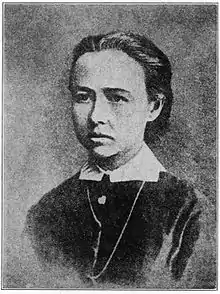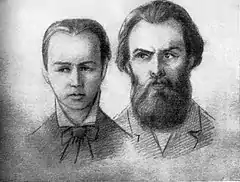Sophia Perovskaya
Sophia Lvovna Perovskaya (Russian: Со́фья Льво́вна Перо́вская; 13 September [O.S. 1 September] 1853 – 15 April [O.S. 3 April] 1881) was a Russian Empire revolutionary and a member of the revolutionary organization Narodnaya Volya. She helped orchestrate the assassination of Alexander II of Russia, for which she was executed by hanging.
Sophia Perovskaya | |
|---|---|
 | |
| Born | 13 September 1853 |
| Died | 15 April 1881 (aged 27) |
| Spouse(s) | Andrei Zhelyabov |
Biography
Perovskaya was born in Saint Petersburg, into an aristocratic family who were the descendants by marriage of Elizabeth of Russia. Her father, Lev Nikolaievich Perovsky, was the military governor of Saint Petersburg. Her grandfather, Nikolai Perovsky, was a Taurida governor. She spent her early years in the Crimea, where her education was largely neglected, but where she began reading serious books on her own.[1] After the family moved to Saint Petersburg, Perovskaya entered the Alarchinsky Courses, a girls’ preparatory program.[2] Here she became friends with several girls who were interested in the radical movement. She left home at the age of sixteen over her father's objections to her new friends.[1] In 1871–1872, together with these friends, she joined the Circle of Tchaikovsky. In 1872–1873 and 1874–1877, she worked in the provinces of Samara, Tver, and Simbirsk. During this period, she received diplomas as a teacher and a medical assistant.
A prominent fellow member of the Circle of Tchaikovsky, Peter Kropotkin, said the following of Perovskaya:
In her moral conceptions she was a "rigorist", but not in the least of the sermon-preaching type. Perovskaya was a "populist" to the very bottom of her heart, and at the same time a revolutionist, a fighter of the truest steel. She said to me once: "We have begun a great thing. Two generations perhaps, will succumb in the task, and yet it must be done." [1]
In 1873, Perovskaya maintained several conspiracy apartments in Saint Petersburg for secret anti-tsarist propaganda meetings that had not been sanctioned by the authorities. In January 1874, she was arrested and placed in the Peter and Paul fortress in connection with the Trial of the 193. She was acquitted in 1877–1878. Perovskaya also took part in an unsuccessful attempt to free Ippolit Myshkin, a revolutionary and a member of Narodnaya Volya. In the summer of 1878, Perovskaya became a member of Zemlya i Volya, was soon arrested again, and banished to the Olonets Governorate. She managed to escape on her way to exile and went underground.
As a member of Zemlya i Volya, Perovskaya went to Kharkov in order to organize the liberation of political prisoners from the central prison. In the fall of 1879, she became a member of the Executive Committee and later a member of the administrative committee of Zemlya i Volya. Perovskaya propagandized among students, soldiers, and workers, took part in organizing the Worker's Gazette, and maintained ties with political prisoners in Saint Petersburg. In November, 1879 she took part in an attempt to blow up the imperial train on its way from Saint Petersburg to Moscow. The attempt failed. On her return to Saint Petersburg she joined Narodnaya Volya.[1]

Perovskaya participated in preparing assassination attempts on Alexander II of Russia near Moscow (November, 1879), in Odessa (spring of 1880), and Saint Petersburg (the attempt that eventually killed him, 1 March 1881). She was the closest friend and later the wife of Andrei Zhelyabov, a member of the executive committee of Narodnaya Volya. Perovskaya was arrested on 10 March 1881. Just before her trial, she wrote in a letter to her mother:
My darling, I implore you to be calm, and not to grieve for me; for my fate does not afflict me in the least, and I shall meet it with complete tranquility, for I have long expected it, and known that sooner or later it must come. [...] I have lived as my convictions dictated, and it would have been impossible for me to have acted otherwise.[3]
She was the first woman in Russia sentenced to death for terrorism. Four other Pervomartovtsy, including Zhelyabov, were hanged with her.[1]
Legacy
Three decades after her death, Perovskaya would become the inspiration for the Japanese feminist Kanno Sugako, who was involved in a 1910 plan to assassinate the Emperor Meiji.[4] Kanno was also executed by hanging.
In 2018 the New York Times published a belated obituary for Perovskaya.[5]
In literature
- Henry Parkes was inspired by her to write the poem, The Beauteous Terrorist. Reproduced in full in The Beauteous Terrorist and Other Poems by Sydney Electronic Text and Image Service.
- Moss, Walter G., Alexander II and His Times: A Narrative History of Russia in the Age of Alexander II, Tolstoy, and Dostoevsky. London: Anthem Press, 2002. Several chapters on Perovskaya. (available online)
- Croft, Lee B. Nikolai Ivanovich Kibalchich: Terrorist Rocket Pioneer. IIHS. 2006. ISBN 978-1-4116-2381-1. Content on Perovskaya, including her father, mother, and her unmarked burial.
- Jan Guillou uses Perovskaya in his book ”Men inte om det gälle din dotter” (”But not if in concerns your daughter”) as an example of how changes in political situation can alter the perception of a person between being a terrorist and a freedom fighter.
See also
- 2422 Perovskaya
- Women in the Russian Revolution
References
- Sack, Arkady Joseph (1918). The Birth of the Russian Democracy. Russian Information Bureau. pp. 58–60. Retrieved 24 November 2011.
- Broido, Vera (1977). Apostles into Terrorists: Women and the Revolutionary Movement in the Russia of Alexander II. Viking Press. p. 75. ISBN 978-0-670-12961-4.
At fifteen, she entered the Alarchinsky Courses, designed to prepare girls for university studies.
- Soviet Russia, Volume 7. Russian Soviet Government Bureau. 1922-01-01. p. 86.
- Hane, Mikiso (1993). Reflections on the Way to the Gallows: Rebel Women in Prewar Japan. University of California Press. p. 55. ISBN 978-0-520-08421-6.
Kanno was enthusiastic about carrying out the plan, hoping to emulate Sophia Perovskaya
- "Overlooked No More: The Soviet Icon Who Was Hanged for Killing a Czar". The New York Times. Retrieved 2018-05-31.
The first woman to be executed for a political crime in Russia, Perovskaya is credited with pushing the empire down the road to revolution and was later given the mantle of martyrdom.
External links
- Recording of the 1967 Soviet film "Sophia Perovskaya" (Софья Перовская) on YouTube
 Media related to Sophia Lvovna Perovskaya at Wikimedia Commons
Media related to Sophia Lvovna Perovskaya at Wikimedia Commons